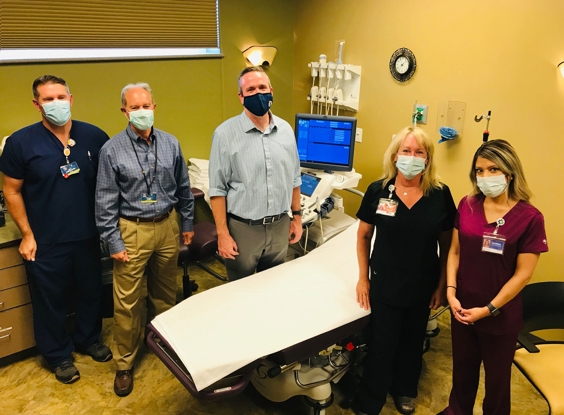Postpartum Medications
- Colace: this medication is a stool softener that helps to prevent straining while having a bowel movement. It can be purchased over the counter.
- Hydrocodone/Vicodin: this is a narcotic pain medication used to treat moderate to severe pain.
- IV Fluids: typically, you can expect the IV to be removed 12 - 24 hours after delivery.
- Milk of Magnesia: this medication is a laxative that is taken for constipation. It can be purchased over the counter.
- Motrin/Ibuprofen: anti-inflammatory by mouth every 6 - 8 hours as needed for pain.
- Percocet/Oxycodone: this is a narcotic pain medication used to treat moderate to severe pain.
- Pitocin: this medication causes uterine contractions. It is used after delivery of the placenta to keep the uterus contracted and prevent excessive postpartum bleeding.
- Simethicone: this medication is used to reduce bloating, discomfort or pain caused by excessive gas.
- Tylenol: this may be given in addition to other pain medications to help decrease pain.
- Toradol: this is an IV medication used for pain relief. It is most frequently given for the first few hours after surgery until you are tolerating food and drink.
- Zofran: this is an IV or oral medication used for nausea and vomiting.
General Information
- This is an abbreviated list of the most common medications we use. Your doctor and nurse will tailor to your needs based on your allergies, condition and pain level.
- All of the medications we give and prescribe are safe for breastfeeding.
- Always consult with your doctor before taking any other medications or homeopathic treatments.
Non-Pharmacologic Postpartum Treatments for Pain Management
- Ice: ice is used to decrease swelling and help reduce pain in the perineum or at your incision site after a C-section. It is especially helpful for the first 24 hours after delivery.
- Peri-Bottle: this is used for cleaning the perineum. Fill with warm water and spray over your perineum. It can also be used while urinating to dilute urine and decrease stinging.
- Dermoplast: this is a topical, local anesthetic spray that can be sprayed directly onto your perineum to decrease discomfort.
- Tucks Pads: the main ingredient in this product is Witch Hazel which provides a cooling, soothing relief to your perineum after delivery. They are also effective at relieving the discomfort of hemorrhoids after delivery.
- Movement: getting out of bed and ambulating throughout the unit/hospital is a great way to get things moving and help reduce/prevent gas pains.
Post Cesarean Section
- There will be discomfort because you have just had a major abdominal surgery.
- Pain is typically felt in the area of the incision. The nurses will help you to move and provide you with tips on how to make moving and doing your daily activities less painful and more manageable.
- Within 8 hours after surgery, the nurses will assist you to the edge of the bed to dangle your legs. At around 12 hours after surgery, the nurse will help get you out of bed and walk around the room. By the next day, it is important to be out of bed and ambulating around your room and the unit frequently.
- A foley catheter will be in place to empty your bladder for up to 12 hours after surgery.
- Your doctor and nurse will work together with you to most effectively address your pain.
- Often we will provide an abdominal binder which is a stretchy support device to take pressure off your incision while you are moving. Your nurse will explain the best times to use or not use the binder.
- Following abdominal surgery gas pains are common, we can give you a medication called Simethicone to help reduce gas. This is an over-the-counter medication that you can continue at home.
- Before you go home, your doctor will provide you with a prescription for pain medications. The nursing staff will educate you on the medications, dosages and frequency. Rotate the use of Tylenol and Ibuprofen and use narcotics such as Percocet for breakthrough pain. Please remember Percocet contains Tylenol when you are calculating how much Tylenol and Percocet you can take in 24 hours.
Postpartum Depression
What is postpartum depression?
Postpartum depression is a mood disorder that does affect one in five women after childbirth. Mothers with postpartum depression experience feelings of extreme sadness, anxiety and exhaustion that may make it difficult for them to complete daily care activities for themselves or for others.
What causes postpartum depression?
Postpartum depression does not have a single cause, but likely results from a combination of physical and hormonal factors. Postpartum depression does not occur because of something a mother does or does not do.
After childbirth, the levels of hormones (estrogen and progesterone) in a woman’s body quickly drop. This leads to chemical changes in her brain that can trigger mood swings. In addition, many mothers are unable to get the rest they need to fully recover from giving birth. Constant sleep deprivation can lead to physical discomfort and exhaustion, which can contribute to the symptoms of postpartum depression.
What are the symptoms of postpartum depression?
- Feeling sad, hopeless, empty or overwhelmed
- Crying more often than usual or for no apparent reason
- Worrying or feeling overly anxious
- Feeling moody, irritable or restless
- Oversleeping, or being unable to sleep even when her baby is asleep
- Having trouble concentrating, remembering details and making decisions
- Experiencing anger or rage
- Losing interest in activities that are usually enjoyable
- Suffering from physical aches and pains, including frequent headaches, stomach problems and muscle pain
- Eating too little or too much
- Withdrawing from or avoiding friends and family
- Having trouble bonding or forming an emotional attachment with her baby
- Persistently doubting her ability to care for her baby
- Thinking about harming herself or her baby
- Intrusive thoughts
- Suicidal or homicidal ideations (IF YOU ARE THINKING OF HURTING YOURSELF OR YOUR BABY, CALL 911)
How can a woman tell if she has postpartum depression?
Only a health care provider can diagnose a woman with postpartum depression. Because symptoms of this condition are broad and may vary between women, a health care provider can help a woman figure out whether the symptoms she is feeling are due to postpartum depression or something else. A woman who experiences any of these symptoms should see a health care provider right away.
How is postpartum depression different from the "baby blues"?
The “baby blues” is a term used to describe the feelings of
worry, unhappiness and fatigue that many women experience after having
a baby. Babies require a lot of care, so it’s normal for mothers
to be worried about, or tired from, providing that care. Baby blues, which
affects up to 80 percent of mothers, includes feelings that are somewhat mild, last a week or two, and go
away on their own. These may also be caused by the new and intense sleep
deprivation caused by infants as well as the hormonal shifts taking place
after the baby is born. If you are experiencing prolonged baby blues,
speak with your provider.
With postpartum depression, feelings of sadness and anxiety can be extreme
and might interfere with a woman’s ability to care for herself or
her family. Because of the severity of the symptoms, postpartum depression
usually requires treatment. The condition, which
occurs in nearly 15 percent of births, may begin shortly before or any time after childbirth, but commonly begins
between a week and a month after delivery.
Are some women more likely to experience postpartum depression?
Some women are at greater risk for developing postpartum depression because they have one or more risk factors, such as:
- Symptoms of depression during or after a previous pregnancy
- Previous experience with depression or bipolar disorder at another time in her life
- A family member who has been diagnosed with depression or other mental illness
- A stressful life event during pregnancy or shortly after giving birth, such as job loss, death of a loved one, domestic violence or personal illness
- Medical complications during childbirth, including premature delivery or having a baby with medical problems
- Mixed feelings about the pregnancy, whether it was planned or unplanned
- A lack of strong emotional support from her spouse, partner, family or friends
- Alcohol or other drug abuse problems.
- Birth trauma which may include a complicated pregnancy, fertility issues, traumatic birth experience, trouble breastfeeding and unexpected or unwanted interventions.
How is postpartum depression treated?
There are effective treatments for postpartum depression. A woman’s health care provider can help her choose the best treatment, which may include:
-
Counseling/Talk Therapy: This treatment involves talking one-on-one with a mental health professional
(a counselor, therapist, psychologist, psychiatrist or social worker).
Two types of counseling shown to be particularly effective in treating
postpartum depression are:
- Cognitive behavioral therapy (CBT), which helps people recognize and change their negative thoughts and behaviors; and
- Interpersonal therapy (IPT), which helps people understand and work through problematic personal relationships.
- Medication: Antidepressant medications act on the brain chemicals that are involved in mood regulation. Many antidepressants take a few weeks to be most effective. While these medications are generally considered safe to use during breastfeeding, a woman should talk to her health care provider about the risks and benefits to both herself and her baby.
These treatment methods can be used alone or together.
What can happen if postpartum depression is left untreated?
Without treatment, postpartum depression can last for months or years. In addition to affecting the mother’s health, it can interfere with her ability to connect with and care for her baby and may cause the baby to have problems with sleeping, eating and behavior as he or she grows.
How can family and friends help?
Family members and friends may be the first to recognize symptoms of postpartum depression in a new mother. They can encourage her to talk with a health care provider, offer emotional support and assist with daily tasks such as caring for the baby or the home.
Where can I get more information?
For more information on conditions that affect mental health, virtual resources, and research, go to Postpartum.net, or MentalHealth.gov, or the NIMH website.
Resources
Download: New Mom Checklist for Maternal Mental Health Help
Download: PSI Peer Journal
-

-
Birth Experience Family Birth Center
My birth experience was incredible.
-Submitted by Anonymous -
Allowing Mom and Baby to Bond Family Birth Center
I appreciate you allowing the mom and baby bond just after birth. It is so important because we don't get that time back.
-Submitted by Anonymous




